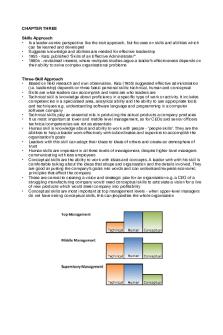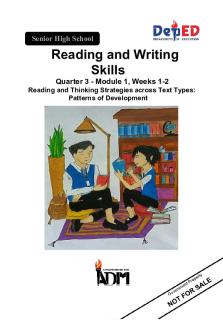HROB2010 * Chapter 3 * Skills Approach PDF

| Title | HROB2010 * Chapter 3 * Skills Approach |
|---|---|
| Course | Foundations of Leadership FW |
| Institution | University of Guelph |
| Pages | 3 |
| File Size | 51.8 KB |
| File Type | |
| Total Downloads | 2 |
| Total Views | 137 |
Summary
Chapter 3 notes...
Description
Chapter 3 Skills Approach THREE-SKILL APPROACH Skills are what leaders can accomplish Traits are who leaders are Leadership skills: defined in this chapter as the ability to use one’s knowledge and competencies to accomplish a set of goals or objectives
Katz suggested that effective leadership depends on… o Technical Skills Includes competencies in a specialized area, analytical ability, and the ability to use appropriate tools and techniques Most important in the lower or middle levels of management o Human Skills The ability to work with people Important in all levels of management o Conceptual Skills The ability to work with ideas, such as creating a vision and strategic plan for an organization Most important at the top level of management
SKILLS MODEL Instead of emphasizing what leaders do, the skills approach frames leadership as the capabilities that make effective leadership possible Mumford characterized this model as the ‘capability model,’ because it examines the relationship between a leader’s knowledge and skills, and their performance Believes that leadership capabilities can be developed over time through education and experience Provides a structure for understanding the nature of effective leadership 5 components of the skill-based model include… Competencies o Problem-solving skills Creative ability to define and solve new and unusual organizational problems Define the problem -> gather information -> formulate new understandings -> generate alternative solutions o Social judgment skills Enable leaders to work with others to solve problems and support to implement change within an organization Being sensitive to how your ideas fit in with others Perspective taking: understanding the attitudes that others have toward a particular problem or solution Social perceptiveness: insight and awareness into how others in the organization function Behavioural flexibility: the capacity to change and adapt one’s behaviour in light of understanding of others’ perspectives in the organization
Chapter 3 Skills Approach
Social performance: based on an understanding of followers’ perspectives, leaders need to be able to communicate their own vision to others o Knowledge The accumulation of information and the mental structures (schema) used to organize that information Individual attributes o General cognitive ability (fluid intelligence) One’s intelligence that grows through adulthood and declines with age Includes perceptual processing, information processing, general reasoning skills, creative thinking capacities, and memory skills o Crystallized cognitive ability Intellectual abilities (ideas and mental abilities) that are learned or acquired over time, through experience Grows through adulthood and does not decline o Motivation Leaders must be willing to tackle complex organizational problems Leaders must be willing to express dominance and exert their influence Leaders must be committed to the social good of the organization o Personality Any personality characteristic that helps people cope with complex organizational situations is related to leader performance Leadership outcomes o Effective problem solving Determined by the originality, uniqueness, logicality, effectiveness, and quality of solutions o Performance Reflect how well the leader has done their job Career experience o Leaders are shaped by their experiences o The experiences a leader acquires influences their knowledge and skills to solve problems Environmental influences o Influences that lie outside the leader’s competencies, characteristics, and experiences o Internal environment influences – technology, facilities, expertise of subordinates, communication o External environment influences – economic issues, political issues, social issues, natural disasters
STRENGTHS OF THE SKILLS APPROACH Stresses the importance of developing particular leadership skills Appealing, as it makes leadership available to everyone Provides an expansive view of leadership that incorporates a wide variety of components including problem-solving skills, social judgment skills, knowledge, individual attributes, career experiences, and environmental influences
Chapter 3 Skills Approach WEAKNESSES OF THE SKILLS APPROACH The range of this approach seems to extend beyond the boundaries of leadership as the components become less precise Weak in predictive value since it does not explain how skills lead to effective leadership performance A major component in the model includes individual attributes, which are ‘trait-like’ It may not be suitable for other contexts of leadership, considering the model was constructed by observing military personnel...
Similar Free PDFs

Lecture 2 - Skills Approach
- 3 Pages

Outline HROB2010 DE W21
- 21 Pages

Chapter 6 Skills -
- 2 Pages

Chapter 9 Skills -
- 2 Pages

Lecture 3 -Integrative Approach
- 18 Pages

Chapter 3 Chapter 3 Chapter 3
- 9 Pages
Popular Institutions
- Tinajero National High School - Annex
- Politeknik Caltex Riau
- Yokohama City University
- SGT University
- University of Al-Qadisiyah
- Divine Word College of Vigan
- Techniek College Rotterdam
- Universidade de Santiago
- Universiti Teknologi MARA Cawangan Johor Kampus Pasir Gudang
- Poltekkes Kemenkes Yogyakarta
- Baguio City National High School
- Colegio san marcos
- preparatoria uno
- Centro de Bachillerato Tecnológico Industrial y de Servicios No. 107
- Dalian Maritime University
- Quang Trung Secondary School
- Colegio Tecnológico en Informática
- Corporación Regional de Educación Superior
- Grupo CEDVA
- Dar Al Uloom University
- Centro de Estudios Preuniversitarios de la Universidad Nacional de Ingeniería
- 上智大学
- Aakash International School, Nuna Majara
- San Felipe Neri Catholic School
- Kang Chiao International School - New Taipei City
- Misamis Occidental National High School
- Institución Educativa Escuela Normal Juan Ladrilleros
- Kolehiyo ng Pantukan
- Batanes State College
- Instituto Continental
- Sekolah Menengah Kejuruan Kesehatan Kaltara (Tarakan)
- Colegio de La Inmaculada Concepcion - Cebu









